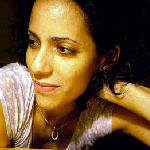
Question 5: SAME-SEX MARRIAGE?
What is your position on same-sex marriage? Do you think its legalization is inevitable? Do you think same-sex couples jeopardize the "sanctity" of the institution?
* * *
|
See my answer to Question 1. |
|
Pro. Yes. No. It really is very simple. When two people love each other and want to spend their lives together, they should be allowed to marry. Some will argue (and I imagine it will be from some of my colleagues in this column) that two people of the same sex will degrade marriage. That it will lead to legalized polygamy. That it is bad for the children. That for 6,000 years marriage has not changed and should not change. In fact, marriage has changed. I would direct everyone to an amazing book called What Is Marriage For? by EJ Graff. It artfully challenges the notion that marriage is a static institution, unchanged through time. In fact, as the world switched from an agrarian feudal system to an industrialized capitalist system, marriage changed from not much more than a business partnership to an institution founded in love. Mix in public policy decisions on divorce and contraception, and the arguments against gays and lesbians marrying become thin and specious. In my film Tying the Knot (www.tyingtheknotthemovie.com), Graff, Evan Wolfson and others deconstruct the notion of traditional marriage and make compelling arguments for inclusion in the civil institution. And yes, we are talking about civil marriage. Not religious marriage. Religions can still decide which couples should and should not be married according to their own edicts. But denying gay and lesbian couples access to the obligations, rights and benefits of civil marriage is just plain old discrimination. But isn't marriage for children? Not in a legal sense, no. Should heterosexuals be required to have children as part of marriage? Of course not. Sex is for love-making as well as child-baking. What about sterile straights? Should they be forbidden to have a civil marriage license? And what about gay and lesbian couples who have children? Should those kids be denied the family protections that marriage affords? Any compassionate, thinking human would say no. So why are some people getting their knickers in a twist? Why do a very few religious folk scream and shout and condemn society to a fiery end because two men or women want to marry? I think it has very little to do with the lesbian and gay people and it has a lot to do with the people screaming. I don't mean in a "methinks ye protest too much" manner that is common in internalized homophobia (though there is bound to be some of that), but in a way that traditional roles are challenged and people freak out. If two women can marry, what does that say to the Promise Keeper husband? If the lord and master of a Southern Baptist family is no better than some other woman's wife, what does that say about him? It says that the sexes are equal. It undermines the power of gender inequality. Who's the boss? So when you hear people saying that marriage brings stability to a couple and married people live longer and on and on . . . Ask them why gay and lesbian couples don't deserve stability. Ask them why gays and lesbians should not live longer. Ask them why my marrying my partner of five years threatens anything in their marriage or the marriage of others. It doesn't. Get on the train to freedom, everyone. Marriage equality is coming.
|
|
I do think gay marriage should be legalized. If I were gay and got married, then got a ticket for gay marriage, I'd be really annoyed. How many points do you get on your license for gay marriage? Probably a lot. Maybe even four. Then your insurance goes up. I think gays will pull it off and get marriage legalized. I think the conservatives who are against it, should be for it. After all, there are so many closeted conservatives giving blowjobs at truck stops and rest stops across America. If they could get married in churches, I think these closeted gay conservatives would be a lot happier. It must be very demoralizing to give blowjobs in truck stops. If they could get on their knees in their own home, maybe even on carpeting, then they wouldn't have to hate themselves so much and feel so demoralized and swear every time that they'll never do that again. If the liberal gays can just pitch to the closeted gay conservatives that this will be good for them, then before you know it, this will be an old issue. While they're at it, I do think it would be great if gays would get behind marijuana legalization as well. They're doing a bang-up job on marriage and could really help the stoners who are too disorganized to make any headway. Gays are much better at headway. We need Queer Eye for stoners. Every gay couple that gets married should light a celebratory joint. Let's kill two birds with one stone, so to speak.
|
|
The legalization of same-sex marriage seems like a welcome inevitability. In the last several decades, we've witnessed a remarkably steep curve towards the acceptance of gay lifestyles and culture. Of course there is still prejudice, and there will surely be setbacks, but I see no reason why this trend won't continue. I'll take anyone's bet that, within a decade, gay unions will be legal in more than half the U.S. Whether the institution of marriage retains its sanctity rests on us as a generation, not on the issue of same-sex marriage. Gays and lesbians will likely adopt the prevalent generational attitude toward the meaning of the union. Because we've delayed marriage so long, we are still forming that generational narrative. From what I've seen anecdotally, we seem to be taking marriage very seriously. The divorce rate has already leveled off, thanks to the strength of later marriages. My guess is that we'll bring marriage back in style and give it fresh meaning at the same time.
|
|
The future is undiscovered territory. Nothing is inevitable but death, and possibly taxes. I am only forty-three years old, but I have lived to see the myth of inevitable destiny exploded on any number of issues. In the absence of a constitutional amendment that defines marriage, I do think many states will end up with same-sex marriage, and the Supreme Court will create its own national definition of marriage to replace the one the American people support. How does same-sex marriage hurt marriage? When courts declare that withholding same-sex marriage is "discriminatory," they are saying that the idea that there is something special about husbands and wives who can become mothers and fathers is just bigotry. Either marriage never was or should not now be about getting mothers and fathers for children. Don't expect to raise a generation of boys to be good family men in a society that treats the idea that children need fathers, as well as mothers, as a species of bigotry. Laws against interracial marriage were about racism, not marriage. They were about keeping two races separate so that one race could oppress the other. Marriage is about bringing opposite sexes together, so children can have moms and dads, and women don't get stuck with the burden of mothering alone. In one sense I agree with Andrew Sullivan: there's not going to be "gay marriage" and "straight marriage." There's going to be one thing called marriage. All of us need to acknowledge that this is not a small change. That thing is going to be different in ways that will likely affect all children, not just the tiny fraction of children living in alternative family forms headed by gay and lesbian adults.
|
|
I think it was the oft-misunderstood Molly Jong-Fast who said in answer to question one, "Yes, in the future people will marry for the wrong reasons — power, fame, or because they are the evil David Gest, and yet the sanctity of marriage will be protected because gay couples who love each other very much and have been together for years will still not be able to marry, which would undermine the beauty and majesty of an institution that Elizabeth Taylor has signed on for eight times (twice with the same man)." And I, on Friday, still agree with her thoughts from Monday. Perhaps that is because I am she. Plus, I still cling to my conviction that David Gest is the devil.
|
|
I think the confusion arises from the two aspects of marriage: the spiritual and the secular. To the extent that marriage is a civil union recognized by the government, same-sex marriage has to be legalized, and must inevitably become so, I think. If we're committed to equal protection under the law, that means granting self-identified couples equal recognition regardless of genitalia. If male-female couples are allowed the smallest advantage over same-sex couples in any area, that's not equal protection, and if they're to enjoy all the same advantages, we may as well call that recognized relationship marriage, as that's the term everyone knows. However, to the extent that marriage is a religious ceremony, each different religion has a right to discriminate as odiously as they like. That's freedom of religion. Catholics don't approve of gay marriage? Then gays can't be married in a Catholic church, or they must petition the Pope to change the rule. There wouldn't be a controversy at all if we'd chosen a different word to indicate the government-approved civil union. The word "marriage" carries too much religious baggage. But there's no question a "marriage" that is 100% secular — recognized by the government, and offered to all couples equally — is inevitable. When that happens, it'll be up to individual religions to carry the torch of intolerance and bigotry as they've done for so many centuries.
|
|
To reiterate, I'm very pro- gay marriage. Which isn't to say that I'm pro-marriage, but rather than I'm quite keen on that line from the Declaration of Independence about what sort of things are self-evident, like all men being created equal. Follow that thought to its logical conclusion, and you get equal rights and equal protections for all. Or at least that's where it has historically led the defenders of the Constitution. The very use of the word "sanctity" is problematic. The definition of sanctity is "the condition of being considered sacred or holy, and therefore entitled to respect or reverence." Which obviously puts us in the realm of the religious, which is not the realm from which the U.S. government is supposed to be making laws. Whether particular denominations or churches refrain from sanctioning same-sex unions is a separate issue; their policies and positions shouldn't affect state and federal legislation. But insofar as the institution of marriage is entitled to respect and reverence, many same sex-couples apparently do revere and respect it, and they want the chance to prove it. Seems to me that allowing more people to marry would increase the sanctity of marriage, rather than the reverse.
|
|
The desire for couples to be married, whether they are straight or gay, is completely understandable. In our culture, it is the most respected way of declaring a commitment. We are raised to believe in love, then marriage. Second, there are real advantages inherent in the institution: health-care coverage, inheritance rights, tax breaks and parenting laws (during the marriage and if a divorce ensues). Why wouldn't couples, gay or straight, wish for this kind of status? I don't believe same-sex marriage jeopardizes the 'sanctity' of the institution in any way. The legalization of same-sex marriages is in our future, but this might take more time than has been expected.
|
|
Of course. I'm all for same-sex marriage. It means defending equal rights. I love hearing some of those who oppose gay marriage using arguments like, "I love my car, but that doesn't mean I should be allowed to marry it. I love my dog, but that doesn't mean I should be allowed to marry him." It's just so absurd. It's laughable. It's so 1950s. I think legalization is absolutely inevitable. Whether it will happen in my lifetime, I'm not sure. It was as recent as 1967 that the Supreme Court ruled the prohibition of interracial marriage unconstitutional. As far as gay marriage jeopardizing the so-called sanctity of the institution, I think our society has already done a fine job of that without the gays. Could same-sex marriage possibly be more detrimental to society than the divorce rate and the effects of divorce on children? I actually imagine that gay married couples will set a much better example than the rest of us.
|
|
Arguments for why only men and women should marry focus on religious, social, and practical considerations. The crux of the debate, though, is one of reproductive and child rearing issues. I have argued that it is best for husbands and wives to raise their child together. But it is disingenuous to assert that that this is the only condition in which one should get, and stay, married. If one takes that position to its logical conclusion, not only would gay marriages be out of the question, so would Brady Bunch marriages, marriages of adoptive parents, marriages of adults who never plan on having children, and senior marriages where one or the other is unable to bear children. I am in favor of formal unions for gays and lesbians who wish to partner for life. In fact, it seems to be in the state’s interest to recognize a formal bond, thereby reducing the risk of sexual promiscuity and encouraging a stable household for these families who, in many cases, are raising children. I predict that all but the most conservative states will recognize same-sex marriage within the next generation. The real challenge is not how to get these pairs to exchange rings, but how to support their marriages and prevent a whole new category of divorces.
|
Question 1:
WHAT IS THE FUTURE OF MARRIAGE?
Question 2:
The FERTILITY GAME: WILL PEOPLE START MARRYING YOUNGER?
Question 3:
Question 4:
Question 5:
Participants:
Question 1:
WHAT IS THE FUTURE OF MARRIAGE?
Question 2:
The FERTILITY GAME: WILL PEOPLE START MARRYING YOUNGER?
Question 3:
Question 4:
Question 5:
Participants:
|
Join the discussion! Tell us what you think about... |
|
|
Same-sex marriage
|
|
|
Open marriage
|
|
|
The future of marriage
|
|










